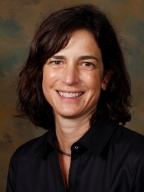
Emily Finlayson, M.D., M.S., FACS
- Professor of Surgery, Medicine, and Health Policy
- Vice Chair for Faculty Affairs and Development
- Director, UCSF Center for Surgery in Older Adults (CSOA)
Contact Information
(415) 476-3474 Academic Office
[email protected]
Education
- 1985-89 Yale University, New Haven, CT- B.A., Arts
- 1990-93 Stanford University, Stanford, CA - Pre-Med
- 1993-97 Harvard Medical School, Boston, MA - M.D.
- 2000-02 Dartmouth Medical School, Hanover, NH - M.S.
Residencies
- 1997-2000 University of California, San Francisco - Intern, General Surgery
- 2002-04 University of California, San Francisco - Resident, General Surgery
Fellowships
- 2000-02 V.A. Outcomes Group, V.A. Medical Center, White River Junction, VT - Fellow, Surgical Outcomes Research
- 2004-05 Mayo Clinic, Rochester, MN - Fellow, Colon and Rectal Surgery
Board Certifications
- American Board of Surgery, 2005
- American Board of Colon and Rectal Surgery, 2006
Program Affiliations
- Philip R. Lee Institute for Health Policy Studies, UCSF
- UCSF Center for Surgery in Older Adults (CSOA)
Biography
Emily Finlayson, M.D., M.S., FACS, Professor of Surgery and Health Policy, Vice Chair of Faculty Affairs and Development and Director of the UCSF Center for Surgery in Older Adults (CSOA). Her clinical areas of expertise include colon and rectal cancer, ulcerative colitis and Crohn's disease, with a focus on minimally invasive surgical techniques.
After completing her medical degree at Harvard Medical School, Dr. Finlayson trained in general surgery at UCSF and in colon and rectal surgery at the Mayo Clinic in Rochester, Minnesota. In her post-doctorate training, she received a Master of Science from the Center for Evaluative Clinical Sciences at Dartmouth Medical School and completed a research fellowship with the VA Outcomes Group in White River Junction, Vermont. She was on faculty at the University of Michigan Department of Surgery and the Michigan Surgical Collaborative for Outcomes Research and Evaluation until she returned to UCSF in 2009. Her current research is in population-based surgical outcomes with a focus on functional outcomes in the frail elderly.
Dr. Emily Finlayson is also Director of the Department of Surgery Faculty Mentoring Program, one that facilitates the development and implementation of robust career plans for incoming faculity. She is also Co-Chair of the Data Registry Subcommittee for the The Coalition for Quality in Geriatric Surgery Project.
Research Overview
Dr. Finlayson's research focuses on using administrative data to examine ‘real world' surgical outcomes in the elderly. For example, in an analysis of operative mortality in 1.2 million Medicare beneficiaries age 65 and older undergoing elective diagnostic high-risk surgery, she found that the risk of death increased dramatically with age. Her work examining the impact of age and comorbidity on operative mortality and survival among octogenarians undergoing cancer surgery demonstrated population-based mortality rates in octogenarians that were considerably higher than those reported in published reports from case series or trials. To better understand surgical risks in elders, she has explored the role of institutional factors in surgical outcomes. As is now widely recognized, her work demonstrated that provider procedure volume is inversely related to operative mortality for many high-risk operations and that this association was greatest in elder surgical patients.
In Dr. Finlayson's most recent work, she uses a national nursing home registry to evaluate outcomes after surgery in long stay nursing home residents. She found that nursing home residents experienced high operative mortality for ‘low risk' procedures. After operations to remove the gallbladder or appendix, more that 1 out of 10 nursing home residents died after surgery. She has also used this data to evaluate survival and functional status after colon cancer surgery and found that nursing home residents experience substantial and sustained functional decline after surgery. One-year survival was less than 50%.
The findings in her epidemiology research inspired the creation of the UCSF Center for Surgery in Older Adults. Under her leadership, the interdisciplinary team of stakeholders from surgery, anesthesia, rehabilitation services, geriatrics, palliative care, nursing, education, and health policy with expertise in quantitative research, qualitative research, and implementation science are working together to develop, implement, evaluate best practices in geriatric surgery through the development of a geriatric surgery registry. Our overarching goal is to discover best practices in geriatric surgery through patient-centered outcomes assessment, comparative effectiveness analyses, and interventional trials. In addition, we identify and explore barriers to delivery of optimal care with the aim to improve implementation of interdisciplinary patient-centered surgical care for older adults at UCSF and beyond.
Mentoring Overview
Health Services & Implementation Science Co-Lead: Dr. Finlayson is a colorectal surgeon trained in health services research with expertise in the treatment of colon and rectal cancer, ulcerative colitis and Crohn's disease. She is a specialist in minimally invasive surgical techniques. Her research examines functional outcomes after major, high-risk surgery in frail older adults and is currently PI on NIA-funded R-01 and R-21 projects. Dr. Finlayson is Director of the Department of Surgery Faculty Mentoring Program and leads the health services research core on the UCSF resident research committee. She has served as mentor for numerous trainees and several junior faculty who have been recently funded by career development awards.
Dr. Finlayson will mentor research trainees in the use of large datasets to evaluate outcomes in older adults undergoing surgery, and in studies of pre-operative "prehabilitation" services to improve surgical outcomes in older adults.
Research & Funding
- Developing Tools to Support the Appropriate Use of Surgery in Frail Older AdultsSponsor: NIH/NIASponsor ID: R21AG054208Funding Period:Sep 2017-May 2019Principal Investigator
- Optimizing treatment for nursing home residents with acute cholecystitisSponsor: NIH/NIASponsor ID: R01AG044425Funding Period:Apr 2014-Mar 2018Principal Investigator
- Functional Outcomes After Major Surgery in Nursing Home ResidentsSponsor: NIH/NIASponsor ID: K08AG028965Funding Period:Sep 2006-Aug 2012Principal Investigator
Clinical Trials
- Study ID: NCT05520866Start Date: Nov 2022Estimated Completion Date: Jan 2025Condition(s): Colon Cancer, Colorectal Cancer
- Study ID: NCT02623335Start Date: Feb 2016Estimated Completion Date: Dec 2018Condition(s): Communication
Publications
MOST RECENT PUBLICATIONS FROM A TOTAL OF 119
- Tang VL, Cenzer I, Keny C, John Boscardin W, Covinsky K, Finlayson E, Kotwal A. Social Strain is associated with Functional Decline in Older Adults after Surgery. J Gen Intern Med. 2023 Nov 09. View in PubMed
- Hamouche F, Hakam N, Unno R, Ahn J, Yang H, Bayne D, Stoller ML, Smith S, Finlayson E, Smith J, Chi T. Reimagining Ambulatory Care in Urology: Conversion of the Urology Clinic into a Procedure Center Improves Patient's Experience. Telemed J E Health. 2023 Oct 20. View in PubMed
- Lin JA, Colley A, Pierce L, Finlayson E, Sudore RL, WIck EC. Clinician Review of Advanced Care Planning for Older Surgical Patients Requiring Intensive Care. Jt Comm J Qual Patient Saf. 2023 Oct 11. View in PubMed
- Bongiovanni T, Gan S, Finlayson E, Ross JS, Harrison JD, Boscardin WJ, Steinman MA. Trends in the Use of Gabapentinoids and Opioids in the Postoperative Period Among Older Adults. JAMA Netw Open. 2023 Jun 01; 6(6):e2318626. View in PubMed
- Colley A, Lin J, Pierce L, Johnson C, Bongiovanni T, Finlayson E, Sudore R, Wick EC. Experiences with targeting inpatient advance care planning for emergency general surgery patients: A resident-led quality improvement project. Surgery. 2023 10; 174(4):844-850. View in PubMed
- View All Publications
In the News
- UCSF News Services - Staff - March 26, 2020Specific health measures – such as function, cognition and psychological well-being – should be incorporated into the assessment of whether major surgery is suitable for older adults, especially if the mortality risk after surgery outweighs the benefits, according to a new study by researchers at UC San Francisco. In a review of nearly 1,350 U.S. patients age 66 and older, almost 1-in-5 of those who had major surgery died within a year. Factors such as dementia and lost ability to perform [...]

- UCSF Department of Surgery - Richard Barg - February 19, 2020The Department of Surgery has launched a new Faculty Affairs and Development Portal. The portal provides an array of tools and resources for our diverse faculty to achieve success in academic surgery over the arc of their careers through mentorship and leadership development. The portal also provides resources for faculty to develop and update their Department of Surgery biography and UCSF research profile, and to build a presence on social media. Resources for writing effective [...]
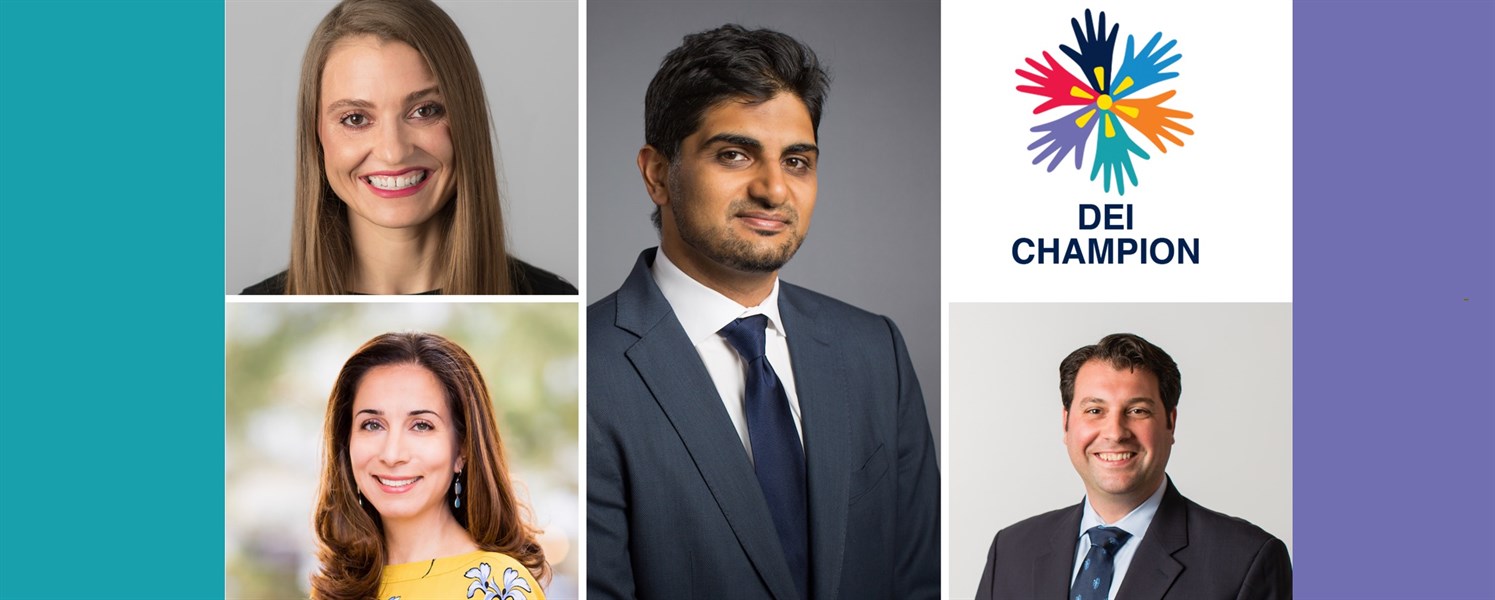
- Center for Surgery in Older Adults - Richard Barg - January 13, 2020PrehabPal garnerered a top prize at the recent Robert Wood Johnson Foundation Healthcare innovation Competition. For its pitch, Ooney demoed its online app for patients preparing to undergo surgery. By providing a selection of targeted exercises or routines, the company looks to reduce the chance of poor outcomes, explained founder Dr. Emily Finlayson. "Every year, over 4 million operations are performed on frail older adults. That's nearly 50% of all major high-risk operations in the US, [...]
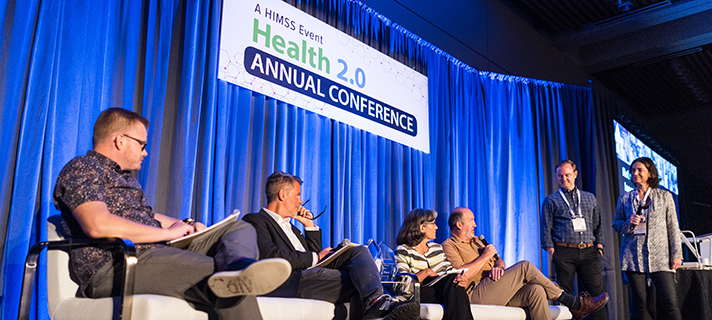
- Center for Surgery in Older Adults - Richard Barg - January 09, 2020The UCSF Center for Surgery in Older Adults is pleased to announce that we have been awarded funding from the UCSF Integrative Oncology Collaborative (IOC) for our pilot project: "PrehabPal: Digitally Enhanced Coaching to Prepare the Mind and Body for Cancer Surgery." The principal investigator on the study is Emily Finlayson MD, MS, Professor of Surgery, Medicine, and Health Policy, and Director of the Center for Surgery in Older Adults. A key component of the project is the web app [...]
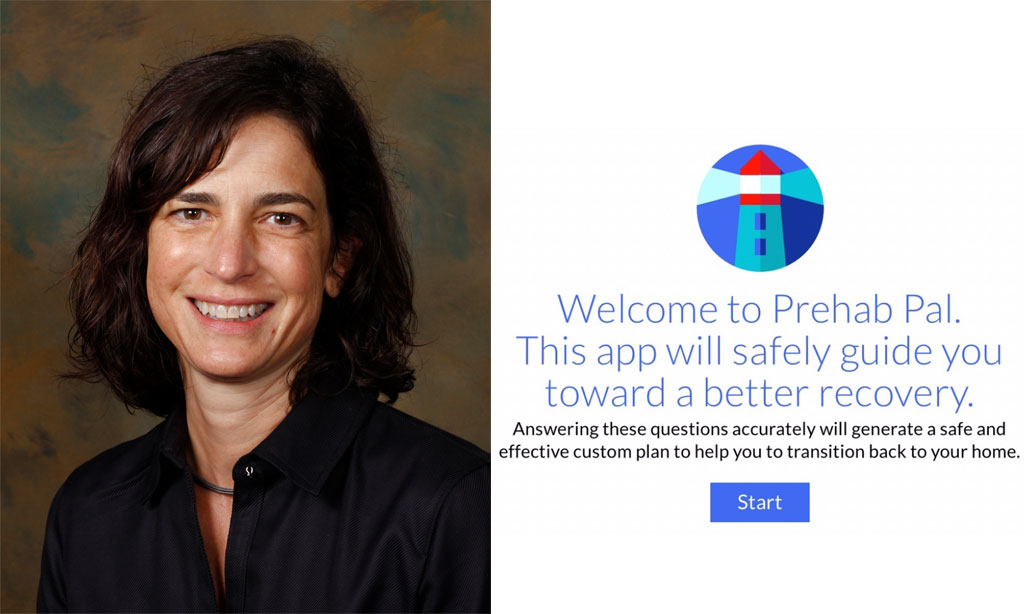
- NextAvenue.com - Julissa Treviño
- October 17, 2019"In modern surgery, it's a rare event to die from surgery," says Dr. Emily Finlayson, director of the University of California San Francisco's Center for Surgery in Older Adults. "The risk comes from being able to recover." ......Fragility, cognition, mobility, depression, how much support how someone has at home — those are all also factors to be considered. These are mostly non-traditional factors, and in particular, "fragility is an emerging concept that goes beyond chronological age. You [...]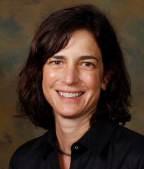
- UCSF Department of Surgery - Richard Barg - February 04, 2019We are pleased to announce that Emily Finlayson, M.D., M.S., FACS, professor of Surgery, Medicine (Geriatrics), and Health Policy at the University of California San Francisco has been named the new Vice Chair for Faculty Affairs and Development in the Department of Surgery. Dr. Finlayson received her MD at Harvard Medical School and MS from the Center for Evaluative Clinical Sciences at Dartmouth Medical School. She completed her general surgery residency at UCSF and her fellowship in [...]

- UCSF Center for Older Adults - Richard Barg - February 13, 2018Emily Finlayson, MD, MS, director of the Center for Surgery in Older Adults at UCSF, was interviewed by Becker's Hospital Review on how hospitals work to prepare at-risk older patients for surgery, screening for frailty and meeting patient's health goals. Older patients undergo major surgery on a regular basis. However, a number of these patients are at risk for experiencing complications, functional decline and loss of independence after surgery. With this in mind, Emily Finlayson, MD, [...]

- Kaiser Health News - Judith Graham Navigating Aging - January 29, 2018Navigating Aging focuses on medical issues and advice associated with aging and end-of-life care, helping America's 45 million seniors and their families navigate the health care system. Surgery can be hard on older adults, resulting in serious complications and death far more often than in younger patients. But many seniors aren't adequately prepared for the risks they might face. Innovative hospitals such as Duke University Medical Center, the University of California-San Francisco Medical [...]

- Center for Surgery in Older Adults - Richard Barg - December 28, 2017A new research study shows that patient frailty should be assessed in preoperative planning for surgery in older adults, even for common ambulatory general surgery operations. The study, led by principal investigator and lead author, Carolyn D. Seib, M.D., MAS, a general and endocrine surgeon at UCSF, was reported on in the journal JAMA Surgery and highlighted by the NY Times in a subsequent article. Importantly, the study found that frailty is more closely associated with the risk of [...]
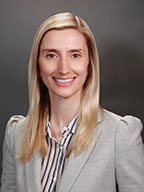
- UCSF Center for Surgery in Older Adults - Richard Barg - January 06, 2016Jennifer Kaplan, M.D., a research resident in the UCSF General Surgery Residency Program, received the award for Best Trainee Poster Presentation from the Academy for Healthcare Improvement (AHI) at the organization's 2015 annual meeting. The presentation, "Health Coaching By Health Professions Students for Frail Older Adults Scheduled for High Risk Elective Surgery", was developed by members of a multidisciplinary research group in the UCSF Center for Surgery in Older Adults (CSOA). In [...]
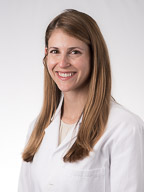
- UCSF Department of Surgery - Richard Barg - August 03, 2015A research team at the UCSF Center for Surgery in Older Adults (CSOA) including faculty, research residents, staff and students, gave a poster presentation about the UCSF Surgery Wellness Program entitled, Get Fit for Surgery: An Interdisciplinary Geriatric Surgery Wellness Program, at the 5th Annual Quality and Safety Symposium hosted by the UCSF Department of Medicine on May 28, 2015. The presentation reported on early results on this new clinical intervention, which launched in February [...]
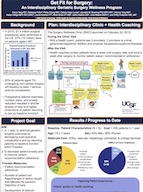
- UCSF Center for Surgery in Older Adults - April 06, 2015UCSF News reports that U.S. only a small number of nursing home residents are alive and ambulatory one year after undergoing lower extremity revascularization procedures with those still alive gaining little, if any, function: Only a few U.S. nursing home residents who undergo lower extremity revascularization procedures are alive and ambulatory a year after surgery, according to UCSF researchers, and most patients still alive gained little, if any, function. The study appears in the April [...]

- UCSF Center for Surgery in Older Adults - March 10, 2015Drs. Emily Finlayson and Jennifer Kaplan received the Innovations Funding for Education Award for their proposal: 'Integrating Interprofessional Learners in High Risk Surgical Patient Care'. Funded by the Academy of Medical Educators Innovation Program, the UCSF Library & Center for Knowledge Management/UCSF Program in Interprofessional Education, and Tideswell at UCSF, their novel new education model links trainee learning with future practice of highly interdisciplinary care of older [...]

- UCSF Center for Surgery in Older Adults (CSOA) - January 05, 2015The UCSF Center for Surgery in Older Adults (CSOA) has published its inaugural Winter 2015 Newsletter: Greetings from the UCSF Surgery Wellness Program. As 2015 draws to a close, we would like to thank our patients, families, and supporters for all they have contributed to this exciting new initiative. We are delighted that our program continues to grow and flourish. With the help of a dedicated care team in the clinic, we are innovating approaches to individualized care for older patients [...]
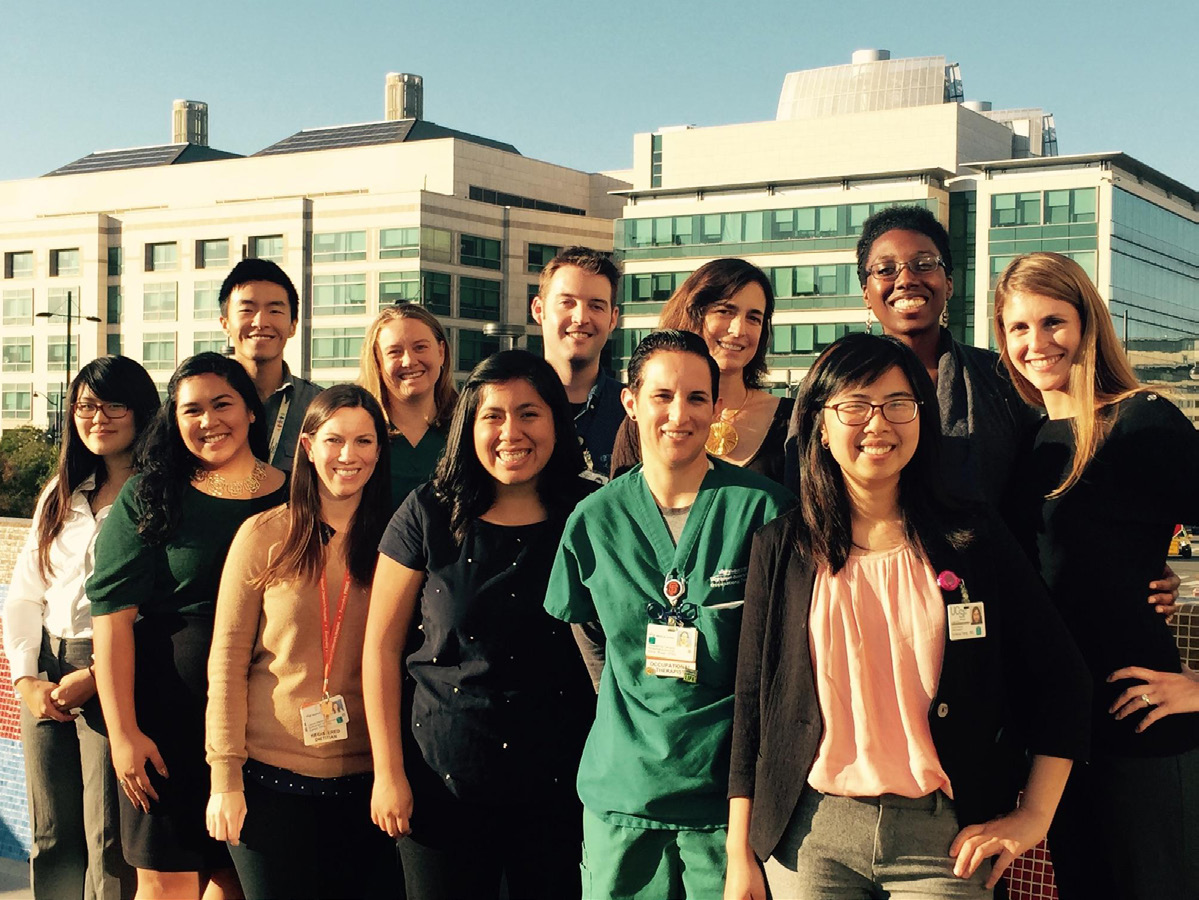
- UCSF Department of Surgery - Richard Barg - January 05, 2015The Department of Surgery has launched a new program, the UCSF Center for Surgery in Older Adults (CSOA). Led by Emily Finlayson, M.D., M.S., an Associate Professor of Surgery and Health Policy, the program seeks to discover and implement patient-centered best practices in geriatric surgery that will help older patients achieve their treatment goals and maintain independence and vitality. The UCSF Center for Surgery in Older Adults Research Collaborative includes investigators from a broad [...]

- UCSF Center for Surgery in Older Adults - August 08, 2014Alexander Smith, M.D., MPH discusses trends and news ideas about surgical outcomes percolating among thought leaders in the field including Emily Finlayson, M.D., M.S., Associate Professor of Surgery and Health Policy at UCSF, in a post at GeriPal, a geriatrics and palliative care blog. A while back people realized that outcomes of surgery in older people were probably better than previously believed. This led to a widespread perception that we were being ageist by not being aggressive [...]
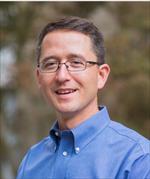
- UCSF Center for Surgery in Older Adults - January 25, 2012The New York Times reports in its "The New Old Age - Caring and Coping Blog" on the high-risk of performing surgery in older adults, even for otherwised routine operations. Even operations considered fairly routine in younger patients, like appendectomies, become high-risk for nursing home residents. "Something about undergoing anesthesia, the surgery's physiological assault on the body, impacts older people much more than we think," said Dr. Emily Finlayson, an Associate Professor of Surgery [...]

- UCSF Center for Surgery in Older Adults - January 19, 2012Alexander Smith, M.D., MPH discusses the exciting rollout of the EPrognosis website and the decision to allow non-clinicians access to the site: Eprognosis is barely a week old, and we've already had over 500,000 pageviews (150,000 unique visitors). For perspective, GeriPal is about 3 years old, and in that time we've had 400,000 pageviews. We've had loads of press, including 6 stories in the New York Times about prognosis and eprognosis (Stories by Paula Span here, here, here, here, [...]

